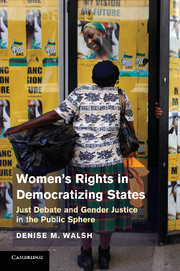2 - Just Debate in the Public Sphere
Published online by Cambridge University Press: 06 December 2010
Summary
“Ignoring someone is a very effective way of censoring them.”
Emily MitchellINTRODUCTION
The just debate approach argues that as debate conditions in the public sphere become more open and inclusive, the content of public debate will include more demands for gender justice. As public pressure for women's rights increases, democratically elected political leaders who do not wish to appear sexist will respond by passing women's rights legislation. In democratizing states, the most influential arenas in the public sphere are legislatures, civil society, and the media. Legislatures pass binding collective decisions, whereas civil society and the media are weaker public arenas that play a significant role in shaping public opinion. In each of these arenas, public discussion over issues of common concern occurs, meaning in principle the discussions are open to all. Politicians in the state and activists in civil society make speeches, engage in debates, and invite citizens to meetings; the media publicize these deliberations.
In this chapter, I explain the theoretical underpinnings for my approach to the public sphere. I begin by defining the public sphere and the specific institutions within each of the arenas that are critical for an analysis of debate conditions in democratizing states. Next, I detail the unique purpose, functions, and gendered contours of these institutions. To do so, I draw upon scholarship that discusses political representation, the boundaries of civil society, and the role of the media in liberal democracies, as well as feminist work that investigates how these three public arenas are gendered.
- Type
- Chapter
- Information
- Women’s Rights in Democratizing StatesJust Debate and Gender Justice in the Public Sphere, pp. 29 - 54Publisher: Cambridge University PressPrint publication year: 2010



